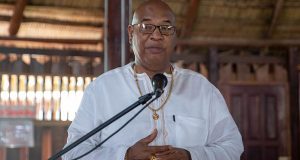WASHINGTON, DC, Mar. 29, (CMC) – Caribbean Community (CARICOM) countries say, there is an urgent need for action to be taken to ensure that banking regulations, designed to foster transparency and accountability and prevent money laundering and terrorism financing, do not result in financial exclusion and economic decline of small economies.
Seven CARICOM countries – Antigua and Barbuda, Bahamas, Barbados, Belize, St. Kitts-Nevis, St. Lucia, and St. Vincent and the Grenadines – have requested a special meeting of the Permanent Council of the Organization of American States (OAS), on Thursday, to discuss the issue.
The meeting will be held under the theme “Finance and Banking Services Challenges to Development in the Americas”.
The regional countries say, they hope the OAS Permanent Council will adopt a resolution, indicating that the “prevailing situation of the severing of correspondent banking relationships with commercial banks in some members states, by global banks in other member states, poses a severe threat to the economic growth, social development and political stability, especially of small economies, by curtailing their ability to participate in standard international financial and economic transaction”.
CARICOM leaders at their inter-sessional summit in Belize, last month, “deplored the progressive decline in correspondent banking relationships available to the banking sector in member states, as a result of the de-risking strategies employed by the global banks”.
They said, that the withdrawal, restricted access and/or the higher cost of such services, allegedly in response to the heightened regulatory posture of regulatory authorities, would destabilize the financial sector in member states, with deleterious effects on growth and economic progress, as well as national security.
The leaders said, they have complied with all global regulatory standards, including those established by the Financial Action Task Force (FATF) and the Global Forum, and have been scrutinized in every detail by the International Monetary Fund (IMF) and other multilateral institutions.
The leaders also agreed to the appointment of a high-level advocacy group, led by the Prime Minister of Antigua and Barbuda, Gaston Browne, which will be charged with the responsibility to represent the interest of the region in addressing the issue, including an approach to the United Nations and the World Trade Organization, as well as the United States Congress,” to create greater international awareness of the challenge confronting the Community”.
According to a draft resolution being circulated ahead of Thursday’s OAS meeting, the regional countries say, they recognize the ongoing work of the United Nations on the issues, and the call, made in the Monterrey Consensus of the International Conference on Financing for Development, for greater coordination of the work of the concerned multilateral bodies and relevant organizations, giving special attention to the needs of developing countries.
They also recall the global commitments for transparent, reasonable and objective national regulation and limiting unnecessary barriers in trade in services, with the goal of strengthening economic integration.
 Pride News Canada's Leader In African Canadian & Caribbean News, Views & Lifestyle
Pride News Canada's Leader In African Canadian & Caribbean News, Views & Lifestyle




